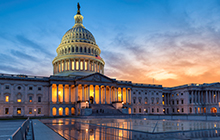 On Monday, January 18, 2021, President Joe Biden announced that he will nominate Rohit Chopra, one of two Democratic commissioners at the Federal Trade Commission (FTC), as the next Director of the Consumer Financial Protection Bureau (CFPB, or the Bureau). This announcement came just days before Kathleen Kraninger, the current CFPB Director who has led the agency since 2018, submitted her resignation at the President’s request. Mr. Chopra, whose nomination to the FTC was unanimously confirmed, is likely to be confirmed as CFPB Director given the Democrat’s control of the Senate. His appointment could radically reshape the CFPB’s regulatory and enforcement agenda, a development which we will discuss in further detail in Goodwin’s forthcoming 2020 Consumer Finance Year In Review.
On Monday, January 18, 2021, President Joe Biden announced that he will nominate Rohit Chopra, one of two Democratic commissioners at the Federal Trade Commission (FTC), as the next Director of the Consumer Financial Protection Bureau (CFPB, or the Bureau). This announcement came just days before Kathleen Kraninger, the current CFPB Director who has led the agency since 2018, submitted her resignation at the President’s request. Mr. Chopra, whose nomination to the FTC was unanimously confirmed, is likely to be confirmed as CFPB Director given the Democrat’s control of the Senate. His appointment could radically reshape the CFPB’s regulatory and enforcement agenda, a development which we will discuss in further detail in Goodwin’s forthcoming 2020 Consumer Finance Year In Review.
Under Mr. Chopra’s leadership, the Bureau is likely to be much more aggressive across the board in initiating investigations and pursuing enforcement actions than it was under Director Kraninger’s leadership, wherein the CFPB advanced a modest enforcement agenda. Under Director Kraninger, the Bureau focused on obtaining consumer relief, restitution, and injunctive relief for what the Bureau sees as clear-cut instances of tangible consumer harm, often to vulnerable populations such as minorities, students, and military servicemembers. In contrast, Mr. Chopra is likely to put emphasis on the Office of Enforcement, and provide resources to that office to increase its new role of being the “change agent” in the markets. He will likely pursue enforcement broadly across the mortgage lending and servicing space, and as to all relevant actors who benefited from an alleged harm—including third-party service providers, investors, and other actors targeted less often by the current CFPB. Consistent with this more expansive view of enforcement, Mr. Chopra might also reopen and reconsider investigations by CFPB staff that were not given final approval to bring enforcement actions during Director Kraninger’s tenure.
Additionally, while Director Kraninger fostered the Bureau’s more lenient approach to civil money penalties, a Chopra-led CFPB is likely to return to the Director Richard Cordray-era (2012-2017) of more punitive enforcement. Mr. Chopra previously served as an assistant director of the CFPB under Director Cordray, where one goal of enforcement was to punish enforcement targets by extracting large civil money penalties through settlements and administrative actions. Indeed, during his FTC tenure, Mr. Chopra criticized what he believed to be settlement terms that were too favorable to the industry. Thus, it is likely that under his leadership, the terms by which industry participants seek to resolve any resulting enforcement actions will be more costly, onerous, and heavily publicized by the CFPB. Mr. Chopra will likely favor “speaking consent orders” that detail more facts than they currently do, particularly in terms of what the CFPB discovered and having the orders tell the CFPB’s “side of the story.” In addition, he will likely resort to public press releases to round out narratives of why the CFPB pursued a matter.
Chopra is also likely to support efforts to “reform” the payday lending industry. Director Kraninger’s CFPB rolled back policies implemented by the Bureau during former Director Cordray’s tenure, including by rescinding the “ability to repay” underwriting requirements of the Payday Lending Rule on the grounds that the CFPB had “re-evaluat[ed] the legal and evidentiary bases for these provisions and [found] them to be insufficient.” However, efforts to restore the original Payday Lending Rule are likely to be on the agenda of a Chopra-led CFPB, in addition to requiring additional loan disclosures and setting interest rate caps. Chopra’s CFPB is also expected to be more aggressive in launching investigations and initiating enforcement actions in the payday lending space as a stop-gap measure until a more comprehensive suite of legislative or regulatory actions can be taken.
Finally, a Chopra-led CFPB may also increase enforcement activity in the student lending space. Mr. Chopra formerly served as the CFPB’s Assistant Director for Student Lending, and eventually transitioned to being named by the Departments of Treasury and Education as the Ombudsman for student lending at the CFPB. While at the CFPB, Mr. Chopra was point person for activities with the entire student loan market – origination, servicing, debt collection, and debt relief. Mr. Chopra was very insistent that the CFPB Offices of Enforcement and Supervision continue to work student lending as a top strategic priority, and has a reputation of advocating for his causes, including student lending, and being a strong proponent of state and federal agency coordination as to those causes, which will likely increase under his leadership.
